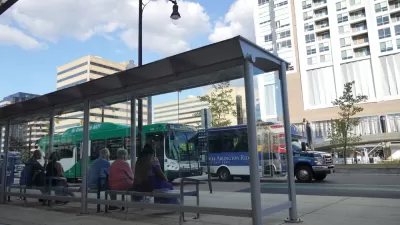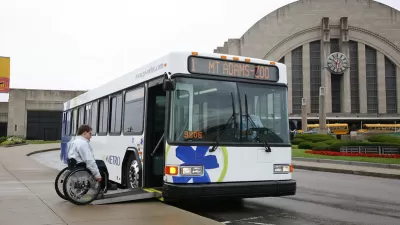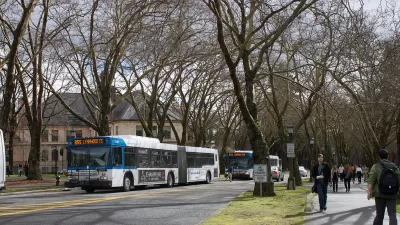With buses as a dominant transport mode for low-income households and "essential workers," free fares would increase access to economic opportunities and free up limited income for cash-strapped commuters.

In an op-ed, Wyatt Gordon and Faith Walker argue for the right to free transit, claiming that "to liberate ourselves from car-dependency, save the planet, and right the wrongs of the past, the bus should be free."
According to Gordon and Walker, "[t]he bus epitomizes a public good: it’s available to all, and society is better off the more people use it." Yet "[u]nlike other public services such as libraries and schools, we expect the bus to pay for itself, largely on the backs of the working poor who take it." In Richmond and other cities like it, the bus is run by a private company.
The bus isn't just useful to those who ride it, say the authors.
[W]hether you even know what GRTC [Greater Richmond Transit Company] stands for or not, you and your lifestyle are transit-reliant. The nurses in your hospital, the clerks at your local supermarket, and the custodians at your office or university represent just a fraction of the folks that rely upon the bus every day to get to work, to pick up their kids from school, and to shop or to seek out healthcare. Without access to fast, frequent, and reliable public transit, much of our economy and our society would come to a screeching halt.
Free transit can help people access jobs and opportunities, get kids to school, and provide crucial access to healthcare. Pointing to how eliminating bus fare can increase equity, the authors point out that "a full 89 percent of GRTC’s riders have household incomes below the state median," while more than half live below the federal poverty line. "If the bus were free like many other public services we all rely upon, Central Virginia’s poorest would get to keep that cash to pay for other essential expenses like housing, food, and healthcare. Going fare free functions as a backdoor boost to wages by allowing those who take transit to work to keep more of their money."
Gordon and Walker conclude that "[i]f our goal is to expand the freedom of our friends, family, coworkers, and neighbors, then eliminating bus fares is one of the most straightforward and equitable actions we can take."
FULL STORY: The Bus Should Be Free

Maui's Vacation Rental Debate Turns Ugly
Verbal attacks, misinformation campaigns and fistfights plague a high-stakes debate to convert thousands of vacation rentals into long-term housing.

Planetizen Federal Action Tracker
A weekly monitor of how Trump’s orders and actions are impacting planners and planning in America.

San Francisco Suspends Traffic Calming Amidst Record Deaths
Citing “a challenging fiscal landscape,” the city will cease the program on the heels of 42 traffic deaths, including 24 pedestrians.

Defunct Pittsburgh Power Plant to Become Residential Tower
A decommissioned steam heat plant will be redeveloped into almost 100 affordable housing units.

Trump Prompts Restructuring of Transportation Research Board in “Unprecedented Overreach”
The TRB has eliminated more than half of its committees including those focused on climate, equity, and cities.

Amtrak Rolls Out New Orleans to Alabama “Mardi Gras” Train
The new service will operate morning and evening departures between Mobile and New Orleans.
Urban Design for Planners 1: Software Tools
This six-course series explores essential urban design concepts using open source software and equips planners with the tools they need to participate fully in the urban design process.
Planning for Universal Design
Learn the tools for implementing Universal Design in planning regulations.
Heyer Gruel & Associates PA
JM Goldson LLC
Custer County Colorado
City of Camden Redevelopment Agency
City of Astoria
Transportation Research & Education Center (TREC) at Portland State University
Jefferson Parish Government
Camden Redevelopment Agency
City of Claremont





























